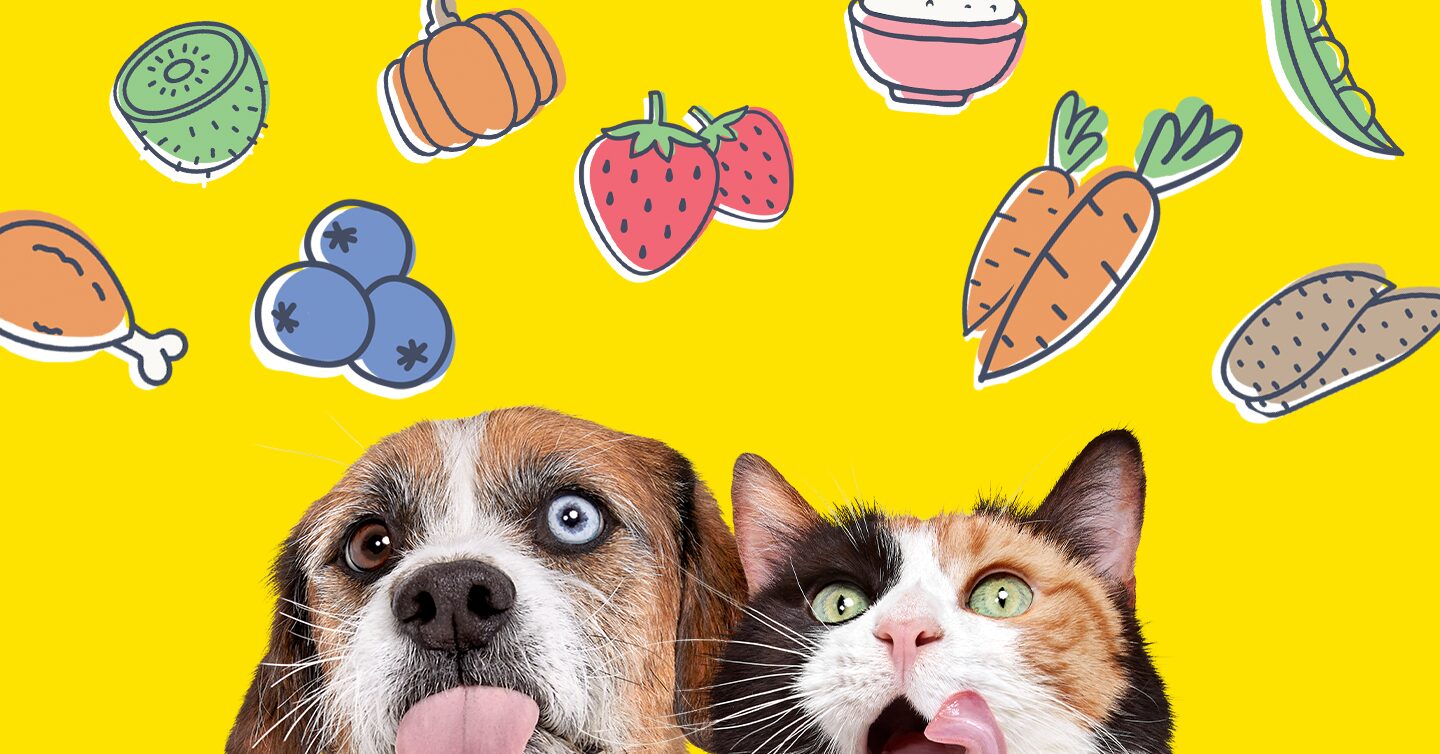Cats and dogs don’t just hold a special place in our hearts and homes; they also hold a special spot at the dinner table and on our sofa during movie night.
While many of us love to indulge our furry friends with the foods we love, we should only share human foods that are safe and healthy for them. If you’ve ever wondered, “What human food can cats eat?” or “Can my dog eat that?”, then use this guide as your cheat sheet.
Pumpkin has consulted veterinarians and other experts to answer the most common questions about pets and human food. Here’s a snackable breakdown of the fruits, veggies, meats, starches, and snacks that are safe to share with dogs and cats — and which to avoid.
Almonds
No — this nut is not safe for cats or dogs.
Almonds might seem like a harmless snack, but they’re tough for pets to digest and can cause stomach upset or blockages. For cats, nuts can be particularly risky since they’re more likely to choke on them. While almonds don’t contain toxins like macadamia nuts, the risk of obstruction makes them a no-go for pets.
Apples
Yes — this fruit is safe in moderation for cats and dogs.
Apples are a crunchy, low-calorie snack rich in vitamins A and C. Remove the seeds and core before feeding, as the seeds contain cyanide. Dogs enjoy apple slices as treats, and cats might nibble on small pieces, though it’s not a natural preference.
Asparagus
Yes — cooked asparagus is safe for dogs.
Cooked asparagus is a safe human food for dogs but offers limited nutritional value. This veggie will be tough for pets to digest when raw. Cats generally won’t be interested, but if they are, a small cooked piece is fine.
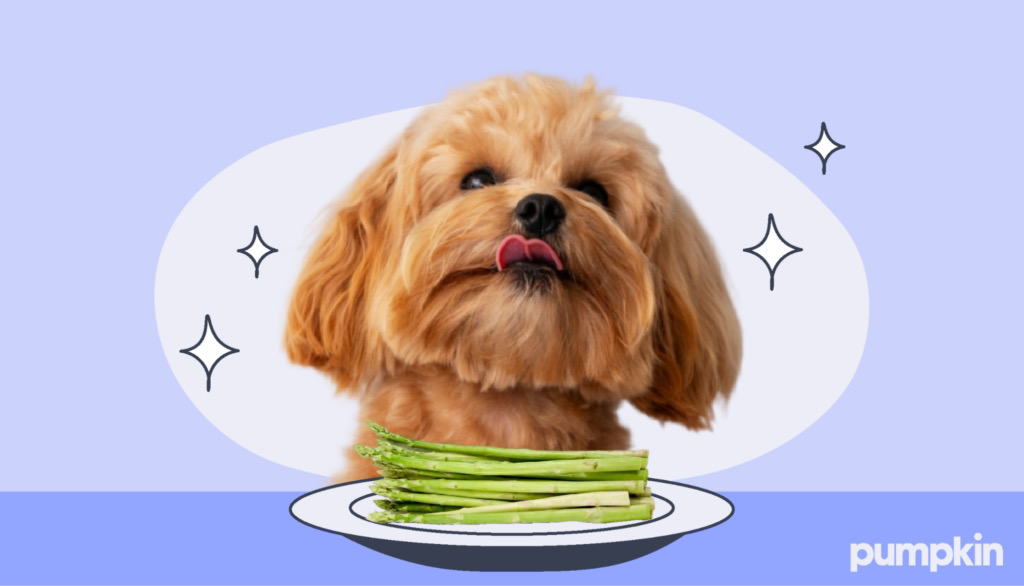
Avocado
No — this vegetable is not safe for dogs or cats.
Avocado contains persin, which can be toxic to pets, especially in the avocado skin, leaves, and pit. Small amounts of flesh are less toxic but should still be avoided.
Bananas
Yes — bananas are safe in moderation for cats and dogs.
Bananas are a great low-calorie treat full of potassium, fiber, and vitamins. Dogs enjoy bananas in small pieces, while cats might nibble on tiny bits. Avoid feeding them banana peels.
Blackberries
Yes — these berries are safe for cats and dogs.
Blackberries are safe and packed with antioxidants and vitamins. Dogs can enjoy a handful as a treat, and cats might nibble on a few.
Blueberries
Yes — they are safe for both dogs and cats.
Blueberries are a superfood full of antioxidants, vitamins, and fiber, making them a safe and nutritious treat. For dogs, a handful of fresh or frozen berries is a great snack; they’re also a smart choice as low-calorie training treats. Cats can also enjoy a few blueberries, though they may be less interested. Keep portions small, as treats should make up only about 10% of your pet’s diet.
Bread
Yes — most bread is safe for dogs in moderation; cats usually avoid it.
Plain bread (without raisins, garlic, or other toxic ingredients) is generally safe for dogs, but they should avoid flavored breads. Cats may nibble on bread out of curiosity, but it’s not a natural part of their diet and offers little nutritional value. Never give raw dough to pets, as it can expand in their stomach and cause serious digestive issues such as bloat.
Broccoli
Yes — safe in moderation for cats and dogs.
Broccoli is safe and nutritious but should be cooked or steamed and served plain. This cruciferous vegetable is also a known cause of dog farts, so start with extra-small serving sizes. In large quantities, its high fiber content can also cause digestive upset.
Brussels Sprouts
Yes — safe for dogs when cooked.
Brussels sprouts are nutritious and safe for dogs when cooked, though they may also cause gas. Cats are less likely to enjoy them but they aren’t considered toxic.
Cantaloupe
Yes — this melon is safe for dogs and cats.
Cantaloupe is hydrating and rich in vitamins. Dogs can enjoy small seedless chunks, while cats might be interested in a tiny nibble. Always remove seeds and rind.
Cauliflower
Yes — safe when cooked for dogs and cats.
Cauliflower is safe when cooked and unseasoned. It’s a low-calorie, high-fiber option, but too much can cause gas.
Celery
Yes — safe for dogs.
Celery is a crunchy, low-calorie treat packed with vitamins. It’s especially good for dogs with bad breath as it can help clean their teeth. For cats, celery is less enticing but safe if they show interest. Always chop the celery into small pieces to avoid choking.
Cheese
Yes — cheese is safe for dogs and cats in moderation, but avoid extra-fatty cheese and cheese with mold cultures (so blue cheese is a no-go).
Most pets love cheese, but it should be given sparingly because of its high fat and sodium content. Dogs can enjoy small cubes as a training reward. Cats can also have a little cheese, though many are lactose intolerant, so monitor them for any signs of stomach upset. Avoid extra-fatty cheeses and cheese with mold cultures.
Cherries
No — not safe for dogs or cats.
Cherries are too risky for pets due to the cyanide in their pits, stems, and leaves. Even a small amount can be toxic, especially for cats or small dogs. It’s best to steer clear of cherries altogether to avoid accidental poisoning.
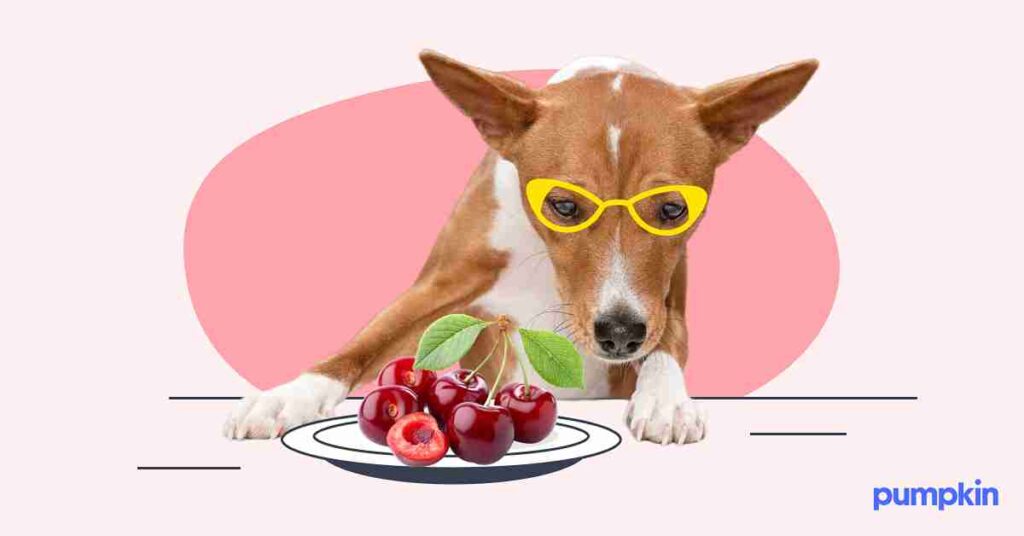
Chicken
Yes — plain and cooked chicken is safe for dogs and cats; they can also eat raw chicken, though it’s not recommended due to the risk of bacterial contamination.
Unseasoned, cooked chicken meat is a healthy and lean protein source for pets. Dogs can enjoy it as a treat or meal topper, and cats may love shredded chicken. Always remove bones and avoid seasoned or fatty cuts. Raw chicken, while sometimes included in raw pet food diets, carries risks of bacteria like salmonella, which can harm both pets and humans.
Chocolate
No — not safe for dogs or cats.
Chocolate contains theobromine, which is toxic to pets. Dark chocolate and cocoa are particularly dangerous. Keep chocolate away from dogs and cats. If your pet has consumed chocolate accidentally, contact your veterinarian, the Pet Poison Helpline, or the ASPCA Animal Poison Control.
Cranberries
Yes — safe in moderation for cats and dogs.
Fresh or dried cranberries are safe but they should be unsweetened if you want to share them with your pet. These fruits can benefit urinary health but may not be appealing to cats.
Cucumbers
Yes — safe for cats and dogs.
Cucumbers are hydrating and full of vitamins, making them a safe snack. For dogs, slices of cucumber can be a refreshing and hydrating treat. Cats can also eat small pieces, though many will turn up their noses at vegetables.
Eggs
Yes — safe when cooked for cats and dogs.
Eggs are a fantastic source of protein and nutrients. Dogs can enjoy scrambled or boiled eggs as an occasional treat as long as they’re prepared without extra oils, salt, and flavoring. For cats, a small amount of cooked egg can be a healthy snack. Never feed them raw eggs, though, as they can carry salmonella. Skip the cheese and salt you might add to your own eggs.
Garlic
No — not safe for dogs or cats.
Garlic is toxic to dogs and cats, causing damage to red blood cells. Avoid it entirely, even in small amounts. Be careful with any human foods that may contain garlic, garlic salt, or garlic powder.
Grapes/Raisins
No — not safe for dogs or cats.
Grapes and raisins can cause kidney failure in dogs and are equally unsafe for cats. Even small amounts can be lethal. Contact your veterinarian or a pet poison helpline for assistance if your dog has stolen some grapes from the counter.
Green Beans
Yes — safe for dogs and cats.
Green beans are a safe, low-calorie treat, and these veggies are a popular kibble topper for overweight dogs. Offer them plain and cooked. Both dogs and cats can enjoy them as a crunchy snack, though cats usually aren’t interested in green veggies like this, as they can’t digest plants.
Ham
No — not safe for dogs or cats.
Ham is loaded with sodium and fat, making it unsuitable for pets. Unlike grapes, garlic, or chocolate, ham isn’t toxic to our pets. That means a small amount isn’t a cause for alarm (and we aren’t judging pet owners who slip their dog a bite of ham as a treat), but large amounts have more risks than rewards.
Dogs may beg for ham, but the high salt and fat content can lead to serious health issues over time. Even a small amount of ham can upset cats’ stomachs. Skip ham entirely to keep your pets safe.
Honey
Yes — safe in moderation for dogs and cats.
Honey is safe for dogs and cats in small quantities. It’s high in sugar, so offer it sparingly, especially for pets with diabetes or weight concerns. Honey is a popular ingredient in homemade dog treats.
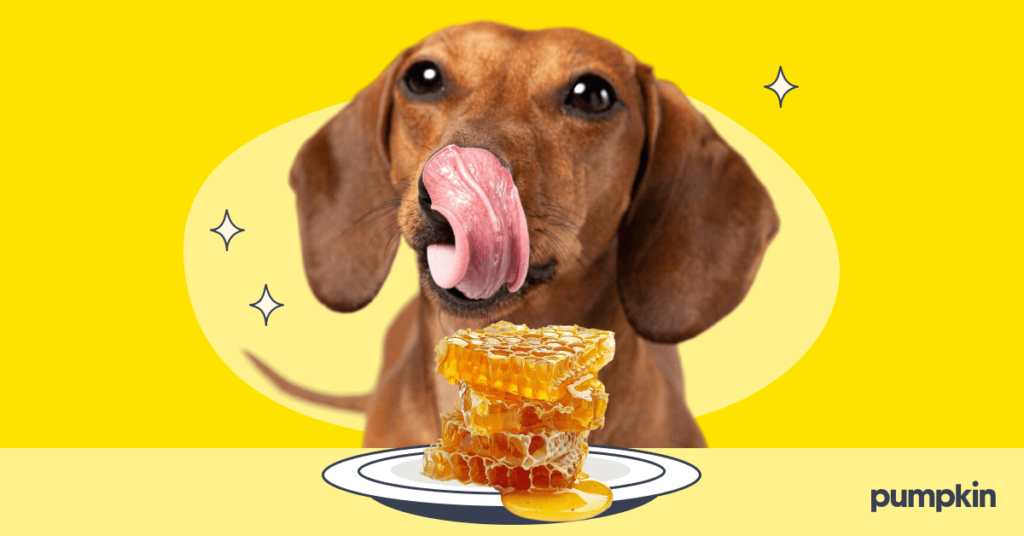
Lettuce
Yes — safe for dogs.
Lettuce is a low-calorie, hydrating snack safe for pets. Dogs may enjoy small, plain pieces as a crunchy treat. Cats might nibble on lettuce but are unlikely to consume much. Avoid adding dressings or seasonings.
Mangoes
Yes — safe in moderation for dogs and cats.
Mangoes are a sweet and nutritious treat. Dogs enjoy small slices, while cats may try a nibble. Remove the skin and pit first.
Mushrooms
Yes, but only store-bought for both.
Store-bought mushrooms are safe and nutritious for pets. Dogs can benefit from their vitamins and cats may enjoy a small nibble. Wild mushrooms, however, can be extremely dangerous, as many are toxic and hard to identify. Stick to plain, cooked mushrooms and avoid added seasoning.
Nuts
No for most nuts. Yes for cashews, peanuts, and peanut butter.
Many nuts, including macadamia nuts, walnuts, and almonds, are toxic or hard for pets to digest, making them unsafe for dogs and cats. Many store-bought nuts and trail mixes also contain dangerous added ingredients such as salt, raisins, or chocolate.
However, some nuts are safe for dogs, such as cashews and peanuts (though, the latter aren’t technically nuts). A spoonful of peanut butter is also a safe and tasty treat for dogs in moderation. Cats can have a tiny taste, but it’s not a natural or necessary part of their diet.
Onions
No — not safe for dogs or cats.
Onions are highly toxic to dogs and cats. They can cause anemia by damaging red blood cells. Avoid raw, cooked, and powdered onion — or any form of onions in your pet’s diet. Also, avoid human foods cooked with onions or onion salt. Even a small amount of onion can be very dangerous to our pets.
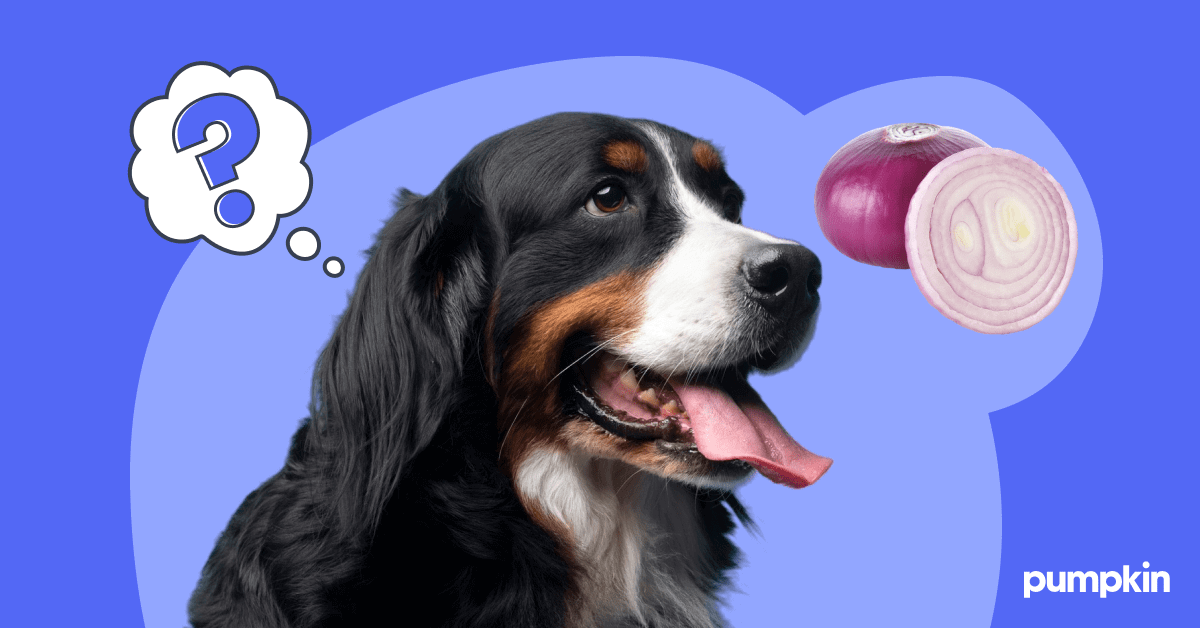
Peaches
Yes for dogs, maybe for cats, but without the pit.
Fresh peach slices are a sweet treat for dogs. However, never let them nibble on the pit, as it contains cyanide and poses a choking hazard. Cats might not show interest, but if they do, remove the pit and offer a small piece.
Peanut Butter
Yes — peanut butter is safe in moderation for dogs and cats, but beware of xylitol, a highly toxic artificial sweetener.
Peanut butter is a favorite treat for dogs. It’s high in healthy fats and protein but must be served in moderation and free of the artificial sweetener xylitol, which is toxic. Cats can also enjoy a tiny amount.
Pears
Yes — safe for dogs and cats when served without seeds.
Pears are safe when cored and sliced. Seeds and stems should be avoided.
Peas
Yes — safe for dogs.
Peas are a nutrient-packed food that provides fiber, vitamins A, K, and B, as well as minerals like iron and potassium. Dogs can enjoy fresh, frozen, or cooked peas as a crunchy treat, but avoid canned peas due to added salt. Cats might nibble on a few peas, but they are less likely to enjoy them.
Pineapple
Yes — safe in moderation for dogs and cats.
Pineapple is one of the best human foods for dogs, offering hydration and a boost of essential nutrients. Packed with vitamins like C and B6 plus fiber and antioxidants, it supports immune health and aids digestion. Always remove the tough outer skin and hard inner core, as they’re not safe for pets to eat. Due to the high sugar content, serve this treat in moderation.
Popcorn
Yes — plain, air-popped popcorn is safe for dogs.
Plain popcorn is a safe snack, but only if it’s free from added butter, salt, or seasonings. Dogs should enjoy the crunch of this low-calorie treat, while cats are less likely to find it appealing. Always remove unpopped kernels.
Potatoes
Yes for cooked, plain potatoes; no for raw or green ones.
Cooked potatoes are safe for dogs and cats. Avoid raw or green potatoes, as they contain solanine, which is toxic. Stick to plain, unseasoned preparations. Mashed potatoes are safe if made without butter, milk, salt, or other harmful seasonings. Keep potatoes simple for a safe treat.
Pumpkin
Yes — safe for dogs and cats.
Plain, cooked pumpkin is excellent for digestion and can help with issues like constipation or diarrhea due to its high fiber and water content. Avoid pumpkin pie or spiced versions, as they often contain sugar, nutmeg, or other ingredients that can be harmful to pets.
Shrimp
Yes — cooked shrimp is safe for dogs and cats.
Shrimp is a protein-packed treat but only offer it cooked and unseasoned. Dogs may love the taste, while cats often find seafood irresistible. Avoid pre-packaged shrimp with added salt or spices. When served raw, this food may contain dangerous bacteria and parasites.

Spinach
Yes — safe in moderation for dogs.
Spinach is nutritious but contains oxalates, which can impact kidney health in large amounts. It’s easiest to digest when cooked. To avoid choking risks, remove the stems before serving. You can serve cooked spinach in moderation to dogs, but cats can’t digest plants and likely won’t be interested.
Strawberries
Yes — safe for both dogs and cats.
Strawberries are a safe and healthy treat. For dogs, they’re a sweet source of fiber and vitamin C. Cats can also enjoy tiny pieces, though they might be less enthusiastic.
Sweet Potatoes
Yes — safe for both cats and dogs.
Sweet potatoes are nutrient-dense and a common ingredient in pet foods. Dogs can enjoy cooked, plain sweet potato cubes or puree, while cats may nibble on mashed sweet potatoes. Avoid adding butter, sugar, or spices — especially nutmeg.
Tomatoes
Yes, ripe and red tomatoes are safe for pets; green tomatoes and parts of the tomato plant are toxic for both.
Ripe, red tomatoes are safe for dogs and cats in small amounts. However, the green parts of the plant (stems, leaves, and unripe fruit) contain solanine, which is toxic. Even though ripe tomatoes aren’t toxic, your pets may not like the acidic taste.
Turkey
Yes — plain, cooked turkey is safe for dogs and cats.
Turkey is a healthy, lean protein source for dogs and cats alike. It’s always safest when cooked, and be sure to avoid cooking with added seasonings or salt. Deli turkey often contains added sodium and preservatives that aren’t great for pets.
Watermelon
Yes — seedless watermelon chunks are safe for dogs and cats.
Both cats and dogs can eat watermelon. It’s a great summer treat for your pets — hydrating, refreshing, and packed with vitamins A, B6, and C. Just be sure to remove the rind and seeds from the watermelon, as these can cause digestion problems. Since this fruit is high in sugar, share it sparingly.
Yogurt
Yes — plain and unsweetened yogurt is safe for cats and dogs.
Yogurt is a creamy, nutritious treat for pets, but only when it’s plain and unsweetened. Packed with probiotics, it supports digestion and makes a great snack or kibble topper. Dogs usually love it, while cats may prefer a small lick. Avoid this treat if your pet is lactose intolerant, and always steer clear of sweeteners like xylitol.
Zucchini
Yes, this healthy veggie is safe for pets.
This tasty squash is a great source of fiber and vitamins A, C, and B9, which makes it a safe snack for cats and dogs alike. Your cat likely won’t show any interest (and may be alarmed by the mere sight of zucchini, as they are with cucumbers), but dogs will likely enjoy a taste. Cook this vegetable and cut it into small pieces to avoid choking risks.
As with all human foods, serve this veggie in moderation.
The best human food for dogs and cats
Every pet has their own unique needs and health considerations, so it’s important to monitor how they respond to new foods. Don’t forget that even if a food is safe, your pet may have food allergies unique to them.
When in doubt, always consult your vet — they’re your best resource for tailored advice to keep your pets safe and happy. Remember, treats are just the icing on the kibble, and they should enhance your pet’s balanced diet, not replace it.
For added peace of mind, you may also want to learn more about pet insurance. Pumpkin Pet Insurance plans can help provide coverage for eligible vet bills in the future, giving you peace of mind when unexpected accidents or illnesses arise.
